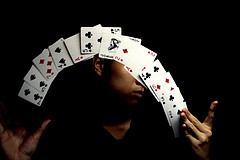People often talk about—even debate—whether teaching is art or science. After reading magician Teller’s recent article “Teller Reveals His Secrets” in Smithsonian magazine, I’m now fully convinced that great teaching is neither art nor science. It’s magic. And, as we talk about and debate how best to select, evaluate, and reward great teachers, we should consider taking some of Teller’s advice.
 Great teaching is neither art nor science. It's magic. Photo by jin.thai. |
It turns out that his most basic secret—the “magic” of Penn & Teller’s work—doesn’t involve a clever slight of hand or carefully developed prop. Instead, it takes hard work, or grit. In simple terms, Teller explains:
You will be fooled by a trick if it involves more time, money and practice than you (or any other sane onlooker) would be willing to invest.
It underscores a simple but all-too-often overlooked life lesson: The only way to be truly great at anything is to set a goal and commit yourself to achieving it beyond what most normal people would think prudent. And then just refuse to give up.
Teller explains, for instance, that he and his partner Penn spent weeks preparing for a minutes-long stint on the David Letterman show. The trick? They produced 500 live cockroaches from a top hat that was sitting on Letterman’s desk. To prepare for the stunt:
We hired an entomologist who provided slow-moving, camera-friendly cockroaches (the kind from under your stove don’t hang around for close-ups) and taught us to pick the bugs up without screaming like preadolescent girls. Then we built a secret compartment out of foam-core (one of the few materials cockroaches can’t cling to) and worked out a devious routine for sneaking the compartment into the hat.
“More trouble than the trick was worth?” Teller wonders. “To you, probably. But not to magicians.”
Any teacher will tell you that outstanding units or lessons don’t just happen.
The same could be said for teaching. Any teacher will tell you that outstanding units or lessons don’t just happen. They are the product of careful and deliberate planning and outstanding execution. And, frankly, they are the product of a dustbin full of the failed lessons that preceded them. In other words, magical teaching is the product of hard work and perseverance and experience and self-reflection.
This is a fact that Angela Duckworth has learned firsthand, first as a teacher and charter-school consultant, then as a researcher and professor at the University of Pennsylvania.
As a teacher and consultant, Duckworth realized that one of the challenges of getting students to achieve at high levels was not just schools or life circumstances, but the character or “grit” of the students themselves. In her application essay to Penn, she explained:
The problem, I think, is not only the schools but also the students themselves. Here’s why: learning is hard. True, learning is fun, exhilarating and gratifying — but it is also often daunting, exhausting and sometimes discouraging. . . . To help chronically low-performing but intelligent students, educators and parents must first recognize that character is at least as important as intellect.
Then, according to a 2011 New York Times article:
Duckworth’s early research showed that measures of self-control can be a more reliable predictor of students’ grade-point averages than their I.Q.’s. But while self-control seemed to be a critical ingredient in attaining basic success, Duckworth came to feel it wasn’t as relevant when it came to outstanding achievement. People who accomplished great things, she noticed, often combined a passion for a single mission with an unswerving dedication to achieve that mission, whatever the obstacles and however long it might take. She decided she needed to name this quality, and she chose the word “grit.”
Grit is exactly what makes Teller great. Like anyone who has achieved true greatness in his or her field, Teller has simply used failure as a lesson that informs his future work. He doesn’t give up. (Even when, at 11, he was pelted with hard candy by fellow Cub Scouts who exposed an early trick for what it was.)
This basic principle is something that organizations like KIPP integrate deep into their organizational culture and their approach to teaching, curriculum, and instruction. Perhaps it also needs to be used as a guiding principle for what we look for in all prospective teachers?
Teach for America may be the furthest ahead in this approach, using their considerable recruiting power to identify candidates with many of the indicators of grit so they will be up to the challenges of a gap-closing approach to teaching. That’s no doubt one of the secrets to how so many young, inexperienced TFA teachers can perform as well or better than their much more experienced peers.
But grit is most powerful when it paves the way for practice. How magical would Teller’s performances have been if he had stopped after two years of practice?
Grit is most powerful when it paves the way for practice.
Before we try to get a TFA teacher in every classroom in America, we should acknowledge that their model gets it only half right. The way they select teachers is something that principals and schools of education should learn from. But widespread magical teaching will only be a regular occurrence in America’s classrooms when that kind of raw grit and talent is honed through years and years of practice.
Imagine a teacher recruitment and preparation program that selected for these critical character traits and encouraged the longevity that teachers need to become great?
That would be true magic.
